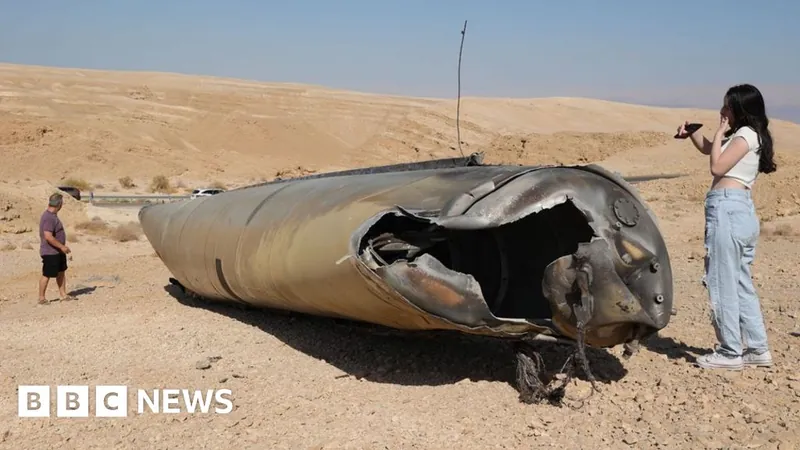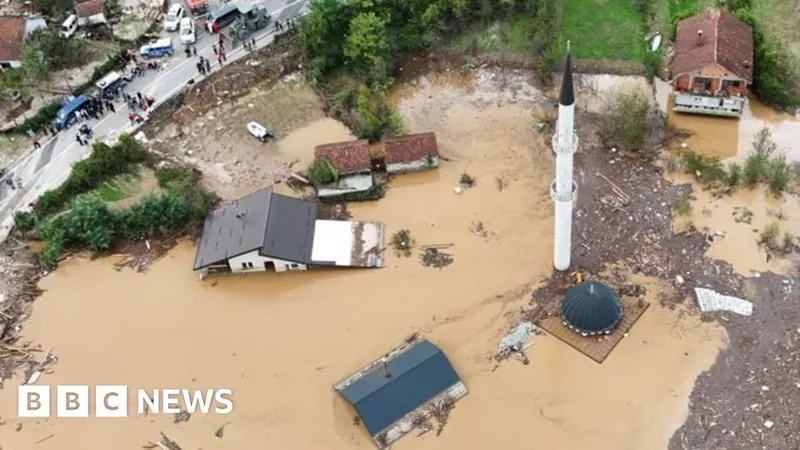
The Ticking Clock: Israel and Iran on the Brink of War! What Happens Next?
2024-10-02
Introduction
The Middle East stands on a precipice once again, as tensions between Israel and Iran intensify, marking one of the region's most perilous moments in the last 45 years.
Historical Context
Since the establishment of the Islamic Republic in 1979, Iran has openly expressed its desire to dismantle what it refers to as the 'Zionist regime.' This hostility has led to an ongoing conflict in which Israel accuses Iran's Revolutionary Guards Corps (IRGC) of instigating violence across the region through its allies. Many Arab nations share this perspective, compounding the threat that the escalating tensions pose.
Recent Developments
Following a recent barrage of ballistic missiles from Iran—some of which successfully breached Israeli air defenses—Israel is on the verge of retaliation. Iran asserts that this missile launch was a response to Israel's alleged assassinations of Hezbollah leader Hassan Nasrallah and Hamas leader Ismail Haniyeh.
Possible Next Steps
Both Israel and its staunch ally, the United States, have stated their intent to hold Iran accountable for the missile attack. Israeli Prime Minister Benjamin Netanyahu has ominously warned, 'Iran will pay a heavy price.' Unlike previous escalations, such as in April, the calls for restraint from Israel's allies appear to be less influential this time, with the Netanyahu government exhibiting a readiness to confront multiple adversaries simultaneously in Lebanon, Gaza, Yemen, and Syria.
The Military Response
As Israeli military planners deliberate their response, the question is not merely whether they will strike Iran, but rather how forcefully they will do so. Equipped with U.S. satellite intelligence and the covert capabilities of Mossad, the Israeli Defense Forces (IDF) have a variety of targets they can strike, spanning three significant categories:
1. Conventional Military Targets
The likely first targets are the launch sites of the ballistic missiles, which include command centers, refueling tanks, and IRGC bases. Israel may aim not only at military installations but could also target key officials linked to Iran's missile development efforts.
2. Economic Infrastructure
Striking critical state assets such as Iran's petrochemical plants or power generation sites would, however, be a controversial move. Such actions would adversely affect ordinary Iranians more than military targets, sparking widespread dissent within Iran.
3. Nuclear Facilities
This is perhaps the most crucial aspect for Israel. The international community, including the IAEA, has confirmed that Iran is enriching uranium far beyond levels required for civilian purposes. Israel remains suspicious that Iran is edging closer to being capable of producing nuclear weapons. High-stakes sites on Israel's radar include Parchin—the center of Iran's military nuclear program—as well as facilities in Tehran, Bushehr, Natanz, and Isfahan.
Iran's Potential Response
As Israeli planners consider their strategy, they must also evaluate Iran's possible reactions. Iran has signaled that it views its missile attack as a completed response, but has warned that any Israeli retaliation will meet with significant retaliation in kind. Iranian President Masoud Pezeshkian stated, 'This is only a glimpse of our capabilities,' while the IRGC has threatened crushing counterattacks against any aggression.
Regional Implications
Despite Iran's military shortcomings—its aging air force, porous air defenses, and the burden of Western sanctions—it possesses an extensive arsenal of ballistic missiles, explosive-laden drones, and allied militias throughout the region. This disparity means that any future missile strikes could very well target civilian areas in Israel, representing an escalation in tactics reminiscent of Iran-backed assaults on Saudi oil facilities in 2019.
Strategic Concerns
Additionally, the IRGC Navy, operating in the Gulf, has fast missile boats capable of overwhelming naval defenses. They could execute disruptive strategies in critical areas like the Strait of Hormuz, potentially jeopardizing 20% of the world's oil supplies and triggering a global economic crisis.
Geopolitical Stakes
Moreover, the U.S. maintains military bases throughout the Arabian Peninsula, and Iran has threatened to target any nations that join in an attack against it, intensifying the geopolitical implications of this conflict.
Conclusion
With such a volatile mix of military readiness, economic implications, and potential retaliation, defense strategists in both Tel Aviv and Washington face daunting calculations as they grapple with an escalating crisis that could spiral out of control at any moment. Stay tuned as these developments unfold!



 Brasil (PT)
Brasil (PT)
 Canada (EN)
Canada (EN)
 Chile (ES)
Chile (ES)
 España (ES)
España (ES)
 France (FR)
France (FR)
 Hong Kong (EN)
Hong Kong (EN)
 Italia (IT)
Italia (IT)
 日本 (JA)
日本 (JA)
 Magyarország (HU)
Magyarország (HU)
 Norge (NO)
Norge (NO)
 Polska (PL)
Polska (PL)
 Schweiz (DE)
Schweiz (DE)
 Singapore (EN)
Singapore (EN)
 Sverige (SV)
Sverige (SV)
 Suomi (FI)
Suomi (FI)
 Türkiye (TR)
Türkiye (TR)